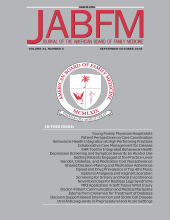Re: The Role of Usual Source of Care in Cholesterol Treatment
In this study, Winters et al1 confirms what family physicians have always known: patients need a primary care physician to receive appropriate chronic disease care. My first response was, “Why bother proving the obvious?” However, we need studies like this. With health care reform bills in the current news, it is to our benefit to validate the role of family medicine in the implementation of any attempt to provide health care to all.
Winters et al1 showed that patients who claimed to have a usual source of care were more likely to be taking a statin. What I found interesting was that being on a statin did not translate into attaining low-density lipoprotein (LDL) goals. I must wonder why. Are we not aggressive in pushing the dosage high enough? Do we believe that it is just taking the statin that improves outcomes? Maybe we are concerned about the side effects, such as myalgias, that occur at higher doses. Perhaps insurance companies’ limits on the selection of generic statins also limits our ability to provide the “best” drug for our patients, and therefore we cannot efficiently achieve LDL goals.
I did a quick literature search about the benefits of low lipids versus being on a statin; the search produced a plethora of studies looking into this question, yet the evidence does not seem to show whether it is the anti-inflammatory properties of the statins or their LDL reductions that produce the benefits. Until we have solid evidence demonstrating the mechanism that produces the benefits of statins, we family physicians will continue to prescribe statins, but may not necessarily aggressively push their dosage high enough to attain full LDL goals.
Re: Parental Acceptance of a Mandatory Human Papillomavirus Vaccination (HPV) Program
This article was interesting. Ferris et al2 conducted this study to look at factors that determine parental acceptance or nonacceptance of a mandatory school-based HPV vaccination program. Since HPV vaccines have become available legislators have been in a quagmire trying to decide whether or not to legislatively mandate HPV vaccinates for school entry. The media has focused on the righteous indignation of parents who do not want to lose the autonomy in making this decision for their children.
I was surprised that the parents of a lower socioeconomic status were more likely to support a mandate. I would have assumed that the more educated parents would be most supportive. Based on this study, it seems that parents who might not be able to afford the vaccine favor it, presumably assuming that if it was mandated the state would cover the cost. The more educated and more financially independent parents placed more value on maintaining their autonomy to make this decision for their children. Maybe they spend more time reading the websites about autism. As I would have expected, parents with more education about HPV were more accepting of the vaccine.
This information will not alter my practice patterns much, but it might affect how I counsel my parents. However, the many practicing family physicians who are involved with public health policy decision making should find this article especially relevant.
Re: Physicians’ Perceptions of Barriers to Cardiovascular Disease Risk Factor Control among Patients with Diabetes: Results from the Translating Research into Action for Diabetes (TRIAD) Study
Based on the long title; the fancy name of the TRIAD study; and the number of authors, their affiliations, and funding sources, I expected a huge study. However, this article reports the summation of interviews with 34 practicing primary care physicians. Crosson et al3 identified something that we all know: many of our diabetic patients encounter barriers that prevent proper control of their disease. These barriers were primarily either patient driven (socioeconomic issues, competing medical conditions, and lack of motivation) or health system driven (cost of care, lack of multidisciplinary team). They also identified that we physicians are frustrated with our inability to really make a difference in many of our patients’ lives.
The authors do focus on physician education and, especially, motivational interviewing as solutions to help physicians deal with the patient-driven barriers. Although I agree that motivational interviewing should work, I think that, for the practicing physician, it may be difficult for us “old dogs” to learn new tricks well. I believe that focusing on motivational interviewing would be more productive at the residency level. In addition solid evidence-based research, it is necessary to show long-term improved outcomes to gain widespread acceptance of this technique and to motivate our patients to improve their health.







